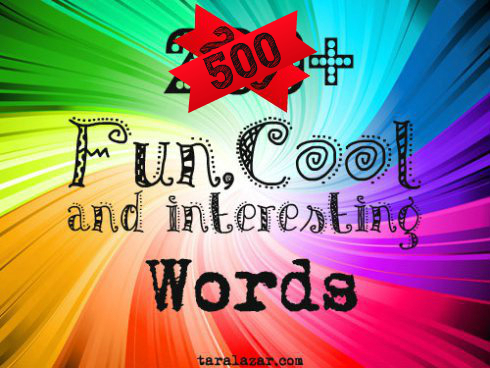Language lets us communicate with each other and share our ideas. Some linguists even suggest that language shapes our knowledge and thought. So, expanding our vocabulary by learning new, interesting words can help us communicate better and have more ideas.
The average English speaking knows around 12,000 -25,000 words, yet the Oxford English Dictionary contains full entries for 171,476 words in current use. So, most of us are missing out on knowing, using, and enjoying thousands of interesting words.
Some linguists suggest that if we don’t have a word for a certain, it is almost impossible to understand that concept. Linguist Benjamin Lee Whorf was an early proponent of this idea, suggesting different linguistic systems affected the thoughts and behaviour of language users.
He studied the language of the Brazilian Piraha people and found that they have no word for quantity. In their language, there is just a word for one, and a word for more than one. This meant that they did not understand the concept of quantity in the same way that we do.
So, if specific words can help us to understand concepts and broaden our knowledge and understanding of the world, it is worth spending some time learning some new, and interesting words.
Here are 15 interesting words to get you started on the journey to crafting a more varied and effective vocabulary.
1. Logophile
I am assuming that as you are reading this article, you may be something of a logophile or ‘lover of words’. Logophile comes from the Greek ‘logos’ meaning speech and ‘phile’ meaning lover or friend.
2. Quixotic
This interesting word is derived from the lead character in Don Quixote written by Miguel de Cervantes. In the novel, Quixote decides to become a knight in order to defend the helpless and destroy the wicked.
Because of this character, we call someone Quixotic if they are unrealistically optimistic or have a comically chivalrous approach to life.
Interestingly, the word scrooge was coined in the same way, a scrooge being a mean person and coming from the character Scrooge in Dickens’ A Christmas Carol.
3. Liminal
Liminal means on the edge of things or between things. It describes marshy landscapes that are neither really land or sea. However, it can also be used to describe states of consciousness. Dreams often occur in the liminal state between sleeping and waking.
4. Esoteric
The word esoteric is used to describe special knowledge that is available only to a select group of people. Belief systems that rely on secret information and practices are often described as esoteric.
Examples of esoteric doctrines include Masonic Lodges, the Theosophical Society, and the Eleusinian mysteries.
5. Numinous
Numinous is a delightful word that means spiritual or supernatural. The word can be applied to anything that is mysterious or surpasses our human understanding.
6. Epistemology
Epistemology is the study of knowledge. This branch of philosophy is specifically concerned with the origin, nature, methods, and limits of human knowledge. So, I guess it really describes the process of thinking about thinking.
7. Schadenfreude
Though schadenfreude is a lovely sounding word, feeling it is not something to be proud of. Schadenfreude means experiencing pleasure or satisfaction from the trouble, failure or humiliation of others.
8. Loquacious
Most of us know someone who is a little loquacious. They talk – a lot! Unfortunately, most of the things they talk about are interesting only to them. This makes them the worst person to get stuck with at a dinner party.
9. Hubris
Hubris is a concept that originated in ancient Greece and today describes excessive presumption, exaggerated pride or self-confidence – even arrogance. It’s a shame that such a nice word describes such a horrible personality trait.
10. Bibliophile
A Bibliophile is a lover of books. The word comes from the Greek biblion ‘book’ + philos ‘lover or friend’. Bibliophiles have a particular interest in beautiful or rare books and many also collect antiques and first editions.
11. Eurhythmic
Eurhythmic means having an aesthetically pleasing rhythm or structure. So, I guess that’s what makes it the perfect name for a band.
12. Fugacious
Fugacious means fleeting or transient. It is similar to the even more attractive ephemeral, which means lasting a very short time.
Many things in life are beautiful but fleeting, the life of a mayfly, the moment the sun goes down on a glorious summer’s day, or the brief time a rainbow decorates the sky. Perhaps it is their fugacious nature that makes these moments so special.
13. Elysian
If something is elysian, it is blissful or delightful. The word comes from the Greek “Elysian field,” where the heroic and the virtuous go after death. So, I suppose it is similar to heavenly.
14. Metanoia
Metanoia describes a profound, usually spiritual, transformation. This unusual word perfectly describes the process of changing one’s mind, heart, spiritual direction, or way of life in a radical way.
This seems like a good word to use instead of the overused ‘enlightened’ or ‘spiritual awakening‘.
15. Lollygag
Lollygag is my favorite new interesting word. It means to spend time in an aimless or lazy way, to idle about or goof off. So, I guess lollygagging is the perfect way to spend an afternoon.
So that’s enough interesting words for today. I am off to spend the afternoon lollygagging.
We’d love to hear your favourite interesting words. Please share them with us in the comments.
References:
- www.collinsdictionary
- www.oed.com
- Author
- Recent Posts
Contributing writer at Learning Mind
Kirstie Pursey holds a diploma in creative writing from the Open University and works as a writer, blogger, and storyteller. She lives in London with her family of people, dogs, and cats. She is a lover of reading, writing, being in nature, fairy lights, candles, fireside, and afternoon tea.
Copyright © 2012-2023 Learning Mind. All rights reserved. For permission to reprint, contact us.
Word lovers and Scrabble players alike often seek out and celebrate weird and interesting words, challenging themselves to include these unusual terms in their everyday speech. Eleven of those weird words are explained here; challenge yourself to use some of them in your conversations this week and see how your friends and teachers react.
Bamboozled
adjective bam·boo·zled bam-ˈbü-zəld
Definition: thrown into a state of confusion or bewilderment especially by being deliberately fooled or misled.
History: A word, a Spike Lee movie, a game show that Joey from “Friends” auditions for, and it’s even an app game—his word has made the rounds. It seems that most everyone agrees on the definition of this word, even Urban Dictionary, which defines it as to be tricked or cheated. According to Merriam-Webster, bamboozle (verb) first appeared in 1703, derived from the 17th-century word “bam” which means to trick or con.
Cattywampus
adjective kat-ee-wom-puh s
Definition: askew; awry; positioned diagonally.
History: Cattywampus comes from catawampus, which, according to Dictionary.com, likely came about between 1830 and 1840. It is derived from the prefix cata, meaning diagonally and likely wampus, which the site says is akin to the word wampish, meaning to flop about.
Discombobulate
verb dis-kuh m-bob-yuh-leyt
Definition: To confuse, upset, frustrate.
History: An American word first used in 1825–1835, according to Dictionary.com, it’s a fanciful alteration of discompose or discomfort.
Flabbergast
verb flab-er-gast
Definition: To overcome with surprise and bewilderment; astound.
History: There’s not much known about the origins of this word, though Dictionary.com says it’s from 1765–1775.
Foppish
adjective fop·pish ˈfä-pish
Definition: foolish, silly, obsolete.
History: This funky little word is derived from the word fop, which is used to redescribe a man who is excessively vain and worried about his dress and appearance; it also can mean a foolish or silly person. The adjective of foppish is similarly used to mean that something is obsolete, foolish or silly. It has been rolling off tongues for centuries now, first appearing in the late 1500s.
Jalopy
noun ja·lopy jə-ˈlä-pē
Definition: an old, decrepit, or unpretentious automobile.
History: An oldie but goodie, jalopy has gotten some present-day love from The New York Post. This word—an American term dating to 1925–1930—is often used when referencing items other than vehicles despite its specific meaning. According to Dictionary.com, a “Post” article revived the word once again, this time in an article about people updating their phones rather than buying new ones. The use of jalopy in this article spurred a more than 3,000-percent increase in searches for the word online.
Lothario
noun loh-THAIR-ee-oh
Definition: a man whose chief interest is seducing women.
History: There’s something about this word that seems slick and seductive, so it’s no wonder that it literally means «a man who seduces women.» The word made its debut in Nicholas Rowe’s play, “The Fair Penitent,” originally staged in 1702 and published in 1703. The lead character, Lothario, was a notorious seducer; an attractive man with a charming exterior, he was really a haughty scoundrel whose main interest was in seducing women.
Meme
noun ˈmēm
Definition: an idea, behavior, style, or usage that spreads from person to person within a culture.
History: Believe it or not, the word meme was first used in 1976, as an abbreviation of the word mimeme in Richard Dawkins’ book «The Selfish Gene» in which he discussed how ideas and styles spread within a culture over time. Today, the word has become synonymous with amusing captioned pictures and videos online. Think, Grumpy Cat or Salt Bae.
Scrupulous
adjective scru·pu·lous ˈskrü-pyə-ləs .
Definition: having moral integrity; acting in strict regard for what is considered right or proper; punctiliously exact, painstaking.
History: Scrupulous means that you are proper and have moral integrity, and on the flip side, unscrupulous means, well, the opposite. An unscrupulous person lacks morals, principles, and a conscience. The word is derived from scruple, which means a weight of a mere 20 grains, which was a meticulous measurement for apothecaries.
Tergiversate
verb [tur-ji-ver-seyt]
Definition: to change repeatedly one’s attitude or opinions with respect to a cause, subject, etc.
History: This unique word holds an honor that very few words can claim: it was named the 2011 Word of the Year by Dictionary.com. Why? According to the website, this weird word rose to fame “because it described so much of the world around us. Editors at Dictionary.com saw the stock market, political groups, and public opinion go through a roller coaster of change throughout 2011.”
Xenophobia
noun zen-uh—foh-bee-uh
Definition: fear or hatred of foreigners, people from different cultures, or strangers; fear or dislike of the customs, dress, etc., of people who are culturally different from oneself.
History: Another Dictionary.com Word of the Year, this time in 2016, Xenophobia has a special claim to fame. Meaning «fear of the other,» the folks at Dictionary.com asked readers to reflect on its meaning rather than celebrate it.
June 9, 2014 in Writing, Writing for Children | Tags: ABSURD WORDS, american slang, Cool Words, crazy words, dictionary, Fun Words, funny words, Interesting Words, Language, Lexicon, random words, slang, thesaurus, tongue-twisters, unusual words, vocabulary, weird words, Words, words for kids
All writers love language. And we especially love fun, amazing words, don’t we? Some have funky spellings, tongue-twisting turns, a satisfying “ooh”…and some sound too hilarious to be true! So I’ve put together a list of favorite fun words that I’ll add to periodically. Have fun, lexicon lovers!
-
It’s a book! More words & super cool facts! Click to order!
abecedarian
- abracadabra
- accoutrements
- adagio
- aficionado
- agita
- agog
- akimbo
- alfresco
- aloof
- ambrosial
- amok
- ampersand
- anemone
- anthropomorphic
- antimacassar
- aplomb
- apogee
- apoplectic
- appaloosa
- apparatus
- archipelago
- atingle
- avuncular
- azure
- babushka
- bailiwick
- bafflegab
- balderdash
- ballistic
- bamboozle
- bandwagon
- barnstorming
- beanpole
- bedlam
- befuddled
- bellwether
- berserk
- bibliopole
- bigmouth
- bippy
- blabbermouth
- blatherskite
- blindside
- blob
- blockhead
- blowback
- blowhard
- blubbering
- bluestockings
- boing
- boffo (boffola)
- bombastic
- bonanza
- bonkers
- boondocks
- boondoggle
- borborygmus
- bozo
- braggadocio
- brainstorm
- brannigan
- breakneck
- brouhaha
- buckaroo
- bucolic
- buffoon
- bugaboo
- bugbear
- bulbous
- bumbledom
- bumfuzzle
- bumptious
- bumpkin
- bungalow
- bunkum
- bupkis
- burnsides
- busybody
- cacophony
- cahoots
- calamity
- calliope
- candelabra
- canoodle
- cantankerous
- catamaran
- catastrophe
- catawampus
- caterwaul
- chatterbox
- chichi
- chimerical
- chimichanga
- chitchat
- clandestine
- claptrap
- clishmaclaver
- clodhopper
- coccyx
- cockamamie
- cockatoo
- codswallop
- collywobbles
- colossus
- comeuppance
- concoction
- conniption
- contraband
- conundrum
- convivial
- copacetic
- corkscrew
- cornucopia
- cowabunga
- coxcomb
- crackerjack
- crescendo
- crestfallen
- cryptozoology
- cuckoo
- curlicue
- curmudgeon
- demitasse
- denouement
- derecho
- derring-do
- desperado
- diaphanous
- diddly-squat
- digeridoo
- dilemma
- dillydally
- dimwit
- diphthong
- dirigible
- discombobulated
- dodecahedron
- doldrums
- donkeyman
- donnybrook
- doodad
- doohickey (this is what I call a library due date card)
- doppelganger
- dumbfounded
- dumbwaiter
- dunderhead
- earwig
- eavesdrop
- ebullient
- effervescence
- egads
- eggcorn
- egghead
- elixir
- ephemeral
- epiphany
- ersatz
- eucatastrophe
- extraterrestrial
- finagle
- fandango
- festooned
- fez
- fiasco
- fiddle-footed
- fiddlesticks
- finicky
- firebrand
- fishwife
- fisticuffs
- flabbergasted
- flapdoodle
- flibbertigibbet
- flimflam
- flippant
- floccinaucinihilipilification
- flophouse
- flotsam
- flummery
- flummoxed
- flyaway
- flyspeck
- folderol
- foofaraw
- foolhardy
- foolscap
- footloose
- fopdoodle
- fortuitous
- fracas
- frangipani
- freewheeling
- fricassee
- frippery
- frogman
- froufrou
- fuddy-duddy
- fussbudget
- futz
- gadfly
- gadzooks
- gallimaufry
- gambit
- gangplank
- gangway
- gargoyle
- gasbag
- gazebo
- gazpacho
- gewgaw
- genteel
- ghostwriter
- gibberish
- gimcrack
- gizmo
- glabella
- glitch
- globetrotter
- gobbledygook
- gobsmacked
- googolplex
- goosebump
- gooseflesh
- gorgonzola
- gossamer
- grandiloquent
- greenhorn
- guffaw
- gumshoe
- guru
- gussied
- guttersnipe
- haberdashery
- haboob
- hairpin
- halcyon
- halfwit
- hangdog
- haphazard
- harebrained
- harumph
- harum-scarum
- headlong
- heartstrings
- heebie-jeebie
- heirloom
- helter-skelter
- hemidemisemiquaver
- heyday
- higgledy-piggledy
- highfalutin
- hijinks
- hillbilly
- hippocampus
- hippogriff
- hobbledehoy
- hobnobbed
- hocus-pocus
- hodgepodge
- hogwash
- hokum
- hoodoo
- hoodwink
- hooey
- hooligan
- hoopla
- hootenanny
- hornswoggle
- horsefeathers
- hotbed
- hotfoot
- hothead
- hubbub
- hullabaloo
- humbug
- humdinger
- humdrum
- hunky-dory
- hurly-burly
- hushpuppy
- huzzah
- hyperbole
- idiom
- idiosyncrasies
- igloo
- ignoramus
- impromptu
- incognito
- incorrigible
- incredulous
- indomitable
- indubitably
- infinitesimal
- interloper
- interrobang
- ironclad
- izzard
- jabberwocky
- jacuzzi
- jalopy
- jamboree
- jargogle
- jawbreaker
- jetsam
- jibber-jabber
- jink
- jitney
- jubilee
- juggernaut
- jujubes
- jumbo
- junket
- juxtaposition
- kaleidoscope
- kaput
- kerfuffle
- kerplunk
- kibosh
- killjoy
- kismet
- knickerbocker
- knickknack
- kowtow
- kumquat
- kvetch
- lackadaisical
- lagoon
- lambasted
- lampoon
- landlubber
- laughingstock
- lexicographer
- limburger
- lingo
- loco
- loggerhead
- logjam
- logophile
- logorrhea
- lollapalooza
- lollygag
- loofah
- loony
- loophole
- lugubrious
- lummox
- machinations
- madcap
- maelstrom
- magnificent
- majordomo
- malapropism
- malarkey
- manifesto
- mastermind
- mayhem
- mealymouthed
- mellifluous
- menagerie
- miasma
- miffed
- milquetoast
- misanthrope
- mishmash
- moocher
- mojo (also a character in THE MONSTORE)
- mollycoddle
- mondegreen
- moniker
- monkeyshines
- monsoon
- mnemonic
- moonstruck
- muckety-muck
- mudpuppy
- mudslinger
- muffuletta
- mufti
- mulligatawny
- mumbo-jumbo
- murmuration
- muumuu
- nabob
- namby-pamby
- nimrod
- nincompoop
- nitwit
- nomenclature
- nonplussed
- nonilllion
- nonuplets
- noodge
- nudnik
- numbskull
- onomatopoeia
- oomph
- orotund
- outfox
- outlandish
- oxymoron
- pachyderm
- pagoda
- palindrome
- palomino
- panache
- pandemonium
- pantaloons
- papyrus
- parabola
- parallelogram
- parapet
- paraphernalia
- peccadillo
- pedagogue
- peewee
- pell-mell
- persimmon
- persnickety
- petrichor
- pettifogger
- phalanx
- phantasmagorical
- phantonym
- phylactery
- piffle
- pizzazz
- plethora
- pogo
- pogonip
- pollex
- pollywog
- poltroon
- pomposity
- poppycock
- portmanteau
- potpourri
- pseudonym
- pugnacious
- pulchritudinous
- pusillanimous
- pussyfoot
- quibble
- quicksilver
- quicksticks
- quiddle
- quinzee
- quirky
- quixotic
- quizzity
- rabble-rouser
- raconteur
- rainmaker
- ragamuffin
- ragtag
- ramshackle
- ransack
- rapscallion
- razzle-dazzle
- razzmatazz
- rejigger
- rendezvous
- resplendent
- rickrack
- ricochet
- riffraff
- rigmarole
- riposte
- roundabout
- roustabout
- rubberneck
- ruckus
- ruffian
- rugrat
- rumpus
- sabayon
- sardoodledom
- sashay
- sassafras
- scalawag (also scallywag)
- scatterbrain
- schadenfreude
- schlep
- schluffy
- schmooze
- schmutz
- scintillating
- scrofulous
- scrumdiddlyumptious (Dahlism)
- scuttlebutt
- serendipity
- sesquipedalian
- shabang
- shenanigans
- skedaddle
- skirmish
- skullduggery
- slapdash
- slapstick
- slipshod
- smithereens
- smorgasbord
- snollygoster
- sobriquet
- sojourn
- spellbind
- splendiferous
- squeegee
- squooshy
- staccato
- stupefaction
- succotash
- supercilious
- superfluous
- surreptitious
- Svengali
- swashbuckler
- switcheroo
- swizzlestick
- synchronicity
- syzygy
- talisman
- taradiddle
- tchotchke
- teepee
- telekinesis
- thingamabob
- thingamajig
- thunderstruck
- tidbit
- tintinnabulation
- toadstool
- toady
- tomfoolery
- tommyrot
- toothsome
- topsy-turvy
- trapezoid
- tub-thumper
- tumultuous
- turducken
- typhoon
- ululation
- umlaut
- umpteen
- unctuous
- usurp
- uvula
- vainglorious
- vagabond
- vamoose
- verboten
- verisimilitude
- vermicious (well, if I included one Dahlism, why not another?)
- vertigo
- verve
- virtuoso
- vivacious
- vuvuzela
- wackadoodle
- wallflower
- wanderlust
- whatchamacallit
- whatsis
- whimsical
- whippersnapper
- whirligig
- whirlybird
- whizbang
- whodunit
- whoop
- widget
- wigwam
- willy-nilly
- windbag
- wipeout
- wiseacre
- wisecrack
- wisenheimer
- wishy-washy
- woebegone
- wonky
- woozy
- wordplay
- wordsmith
- wunderkind
- wuthering
- xylophone
- yahoo
- yokel
- yo-yo
- zaftig
- zeitgeist
- zenzizenzizenzic (yes, this is a word!)
- zephyr
- zeppelin
- ziggurat
- zigzag
- zonked
- zoom
- zydeco
2 words for each letter in the alphabet. The words are fun to say and have a cool meaning. 52 words that make you sound smart when you use them.These words are great vocabulary builders.
52 words
4,869 learners
Learn words with Flashcards and other activities
Other learning activities
Full list of words from this list:
-
zenith
the highest point of something
-
zealot
a fervent and even militant proponent of something
-
yearn
desire strongly or persistently
-
yawner
a person who yawns
-
xenophobia
a fear of foreigners or strangers
-
x-axis
the horizontal axis in a plane coordinate system
-
wonky
turned or twisted toward one side
-
wanton
a lewd or immoral person
-
vermillion
of a vivid red to reddish-orange color
-
vague
lacking clarity or distinctness
-
unique
the single one of its kind
-
uncanny
surpassing the ordinary or normal
-
tenacious
stubbornly unyielding
-
tangible
perceptible by the senses, especially the sense of touch
-
serene
not agitated
-
saquinavir
a weak protease inhibitor used in treating HIV
-
rhetorical
relating to using language effectively
-
rambunctious
noisy and lacking in restraint or discipline
-
quixotic
not sensible about practical matters
-
quell
suppress or crush completely
-
pique
call forth, as an emotion, feeling, or response
-
paradigm
a standard or typical example
-
oxymoron
conjoined contradictory terms
-
optimistically
with optimism; in an optimistic manner
-
nostalgic
unhappy about being away and longing for familiar things
-
narrative
an account that tells the particulars of an act or event
-
misanthrope
someone who dislikes people in general
-
melancholy
a constitutional tendency to be gloomy and depressed
-
lucid
transparently clear; easily understandable
-
lethargic
deficient in alertness or activity
-
ken
range of what one can know or understand
-
karma
effects of one’s actions that determine his or her destiny
-
jurisdiction
the territory within which power can be exercised
-
jejune
lacking interest or significance or impact
-
irony
incongruity between what might be expected and what occurs
-
integrity
an undivided or unbroken completeness with nothing wanting
-
hypnosis
a state that resembles sleep induced by suggestion
-
hyperbole
extravagant exaggeration
-
guise
an artful or simulated semblance
-
gallivant
wander aimlessly in search of pleasure
-
fortitude
strength of mind that enables one to endure adversity
-
fervent
characterized by intense emotion
-
esoteric
understandable only by an enlightened inner circle
-
empathy
understanding and entering into another’s feelings
-
dubious
fraught with uncertainty or doubt
-
disposition
your usual mood
-
cynical
believing the worst of human nature and motives
-
capricious
determined by chance or impulse rather than by necessity
-
bypass
avoid something
-
benevolent
showing or motivated by sympathy and understanding
-
ambiguous
having more than one possible meaning
-
alliteration
use of the same consonant at the beginning of each word
Created on January 4, 2013
(updated January 4, 2013)
Published November 9, 2017
Updated May 4, 2018
From «jumbo» to «namby-pamby» to «nimrod,» these interesting words have surprisingly fascinating backstories.
Jumbo
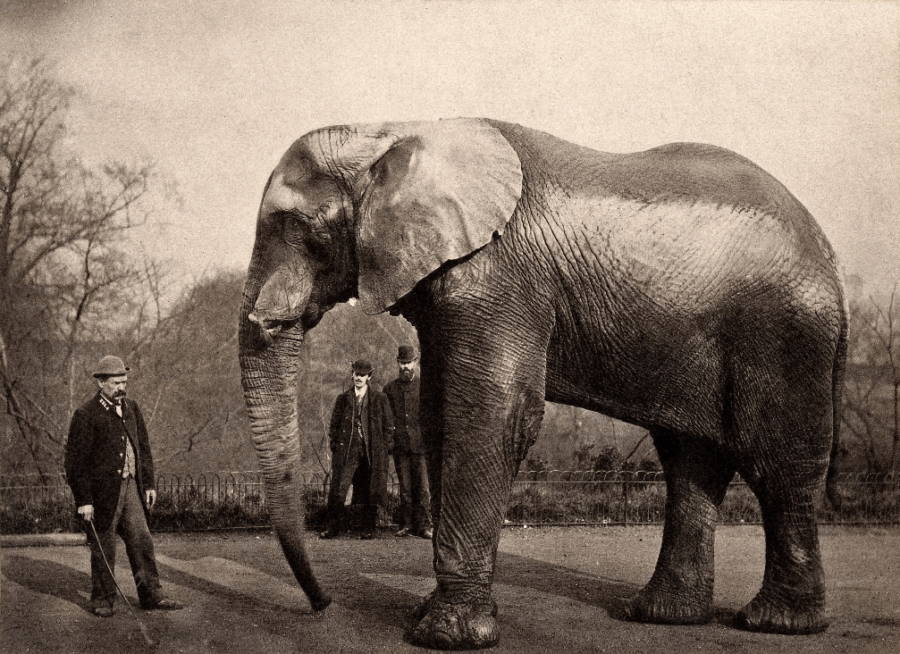
The word «jumbo» was most likely originally the word for «elephant» in a certain West African language. It took on the meaning of «large» in English when an elephant in a London zoo was named Jumbo in 1860 (pictured).Wikimedia Commons
Avocado
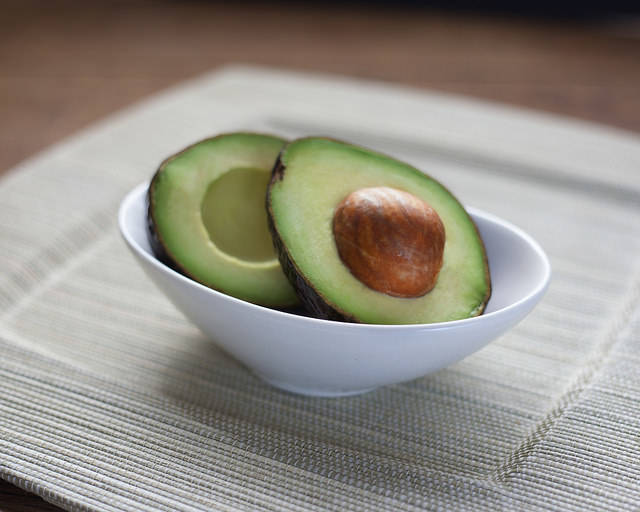
The word «avocado» is derived from «ahuacatl,» a word in the Aztec Nahuatl language that means «testicle.» Kjokkenutstyr/Wikimedia Commons
Jeans

Jeans were named after the place in which their fabric originated: Genoa, Italy.Pixabay
Ketchup

The word «ketchup» is derived from the Chinese word «ke-tsiap,» a pickled fish sauce. The term came to mean a wide variety of condiments, before becoming associated specifically with tomato ketchup.Pixabay
Whiskey
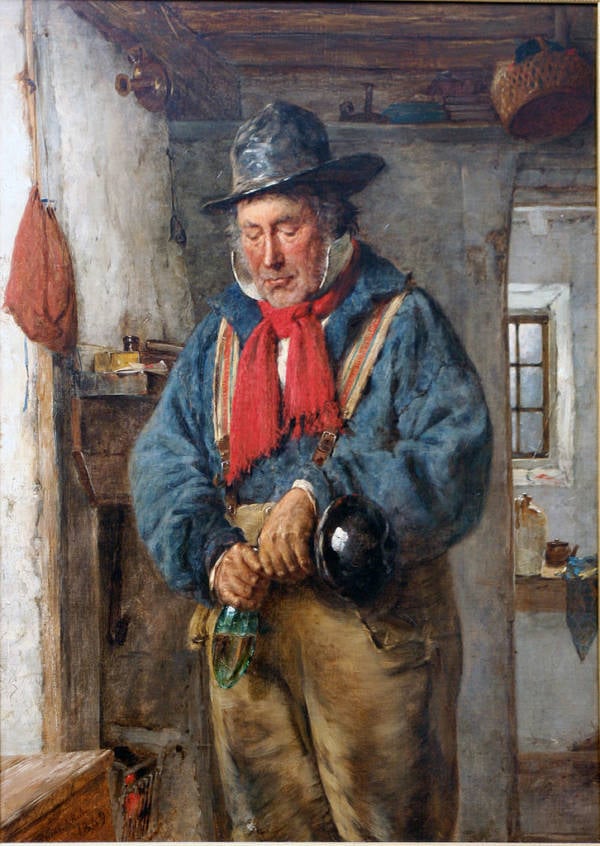
The word «whiskey» comes from the Gaelic phrase «uisge beatha,» which literally means «water of life.»Wikimedia Commons
Assassin

The word «assassin» derived from the word «hashishiyyin,» meaning hashish-users in Arabic, because of a fanatical Muslim sect during the Crusades that used to smoke hashish and then murder leaders on the opposing side.Wikimedia Commons
«Smart Aleck»

The term «smart aleck» refers specifically to a pimp in 1840s New York named Alec Hoag who teamed up with his wife to trick people out of their money.Green Bay Press-Gazette
Buck
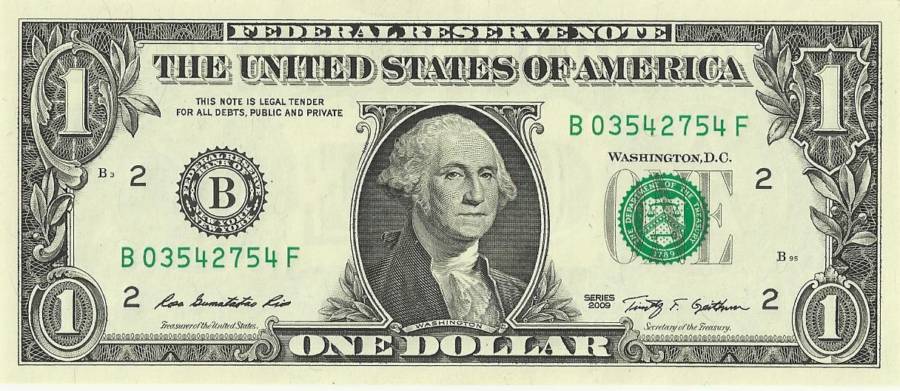
«Buck» as a slang term for an American dollar comes from the fact that, on the American frontier, deerskins, or buckskins, were often used as units of commerce.Wikimedia Commons
Nimrod
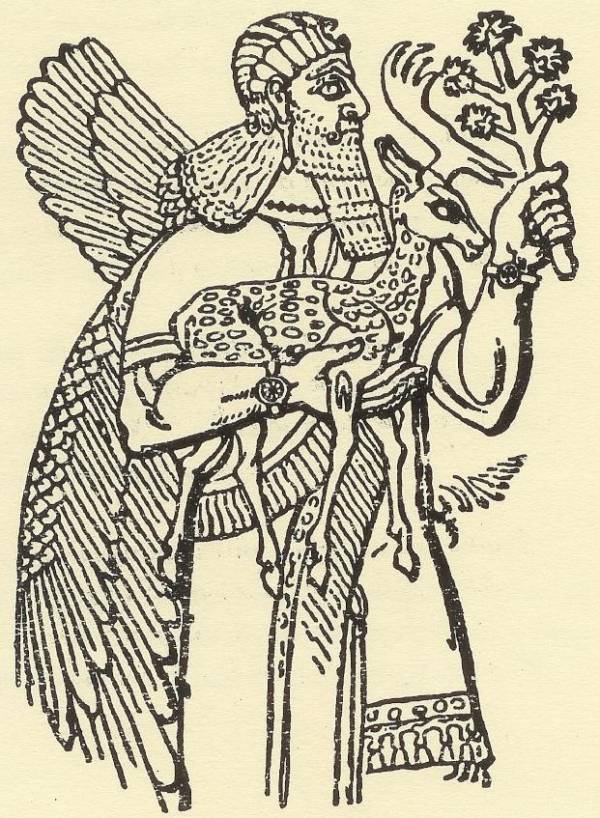
«Nimrod» was originally the name of a mighty hunter in the Bible. The name took on its negative connotation after it was used sarcastically in a Bugs Bunny cartoon from the 1940s.Wikimedia Commons
Lemur
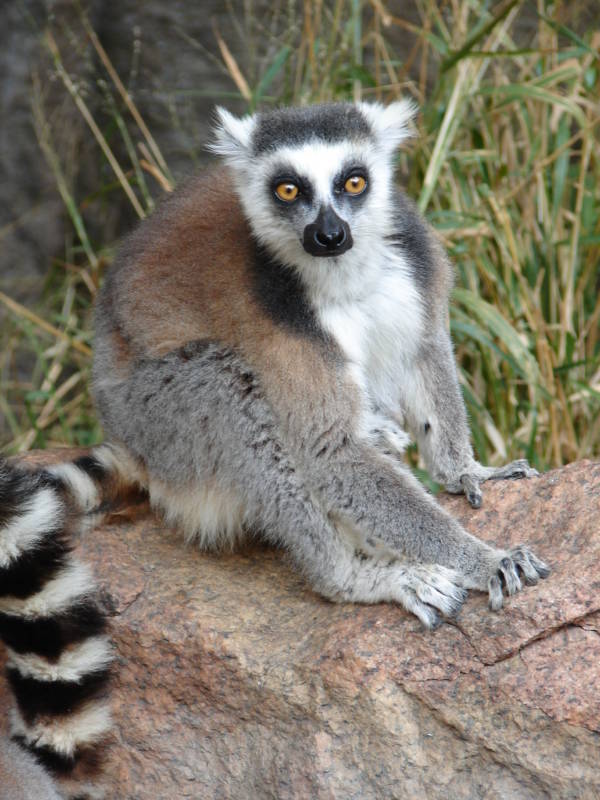
The word «lemur» comes from a Latin word that means «spirit of the dead.» Carl Linnaeus, the Swedish scientist that named these creatures, cited their nocturnal nature as the influence for the name.Wikimedia Commons
Kibosh
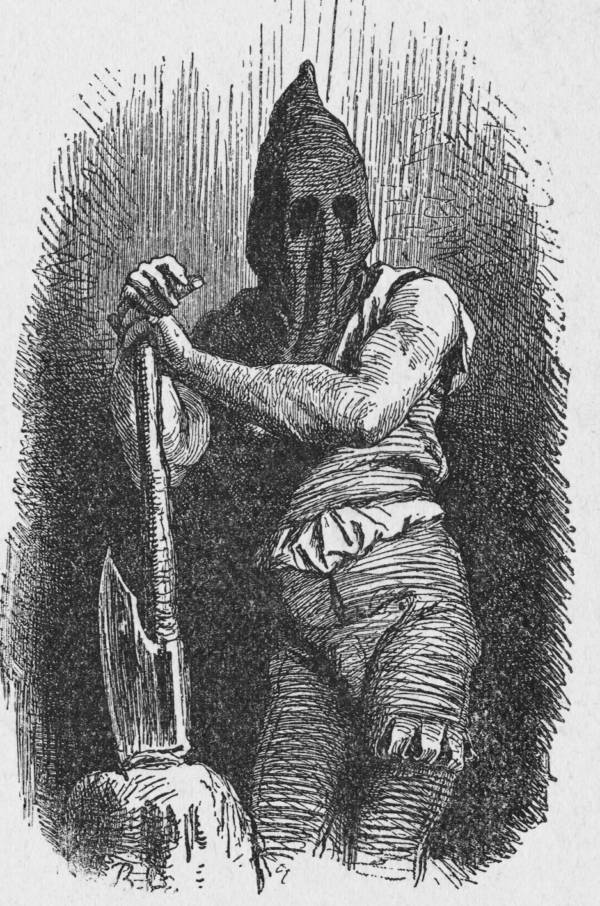
«Kibosh,» as in «to put the kibosh on something,» comes from the Gaelic «cie bais,» which mean «cap of death,» referring to the hood that executioners used to wear.Bettmann/Getty Images
Pamphlet
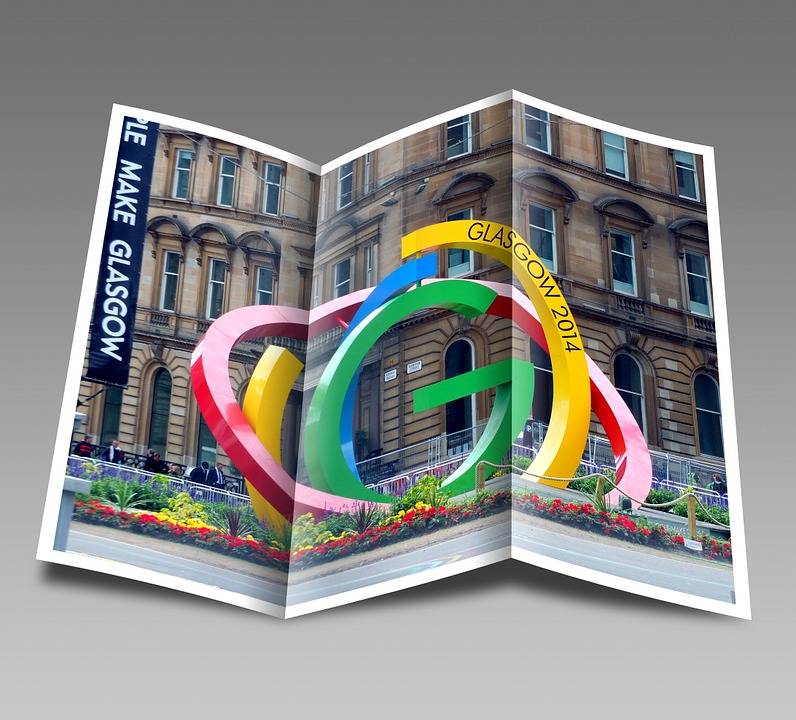
«Pamphlet» comes from the title of a Latin love poem called «Pamphilus, seu de Amore,» which was supposedly passed from person to person, as a pamphlet would be today.Pixabay
Namby-Pamby

The phrase «namby-pamby» originated as an insult created by British satirist Henry Carey based on the first name of poet Ambrose Philips (pictured) for his use of flowery language.Ken Welsh/Design Pics/Corbis/Getty Images
Clue
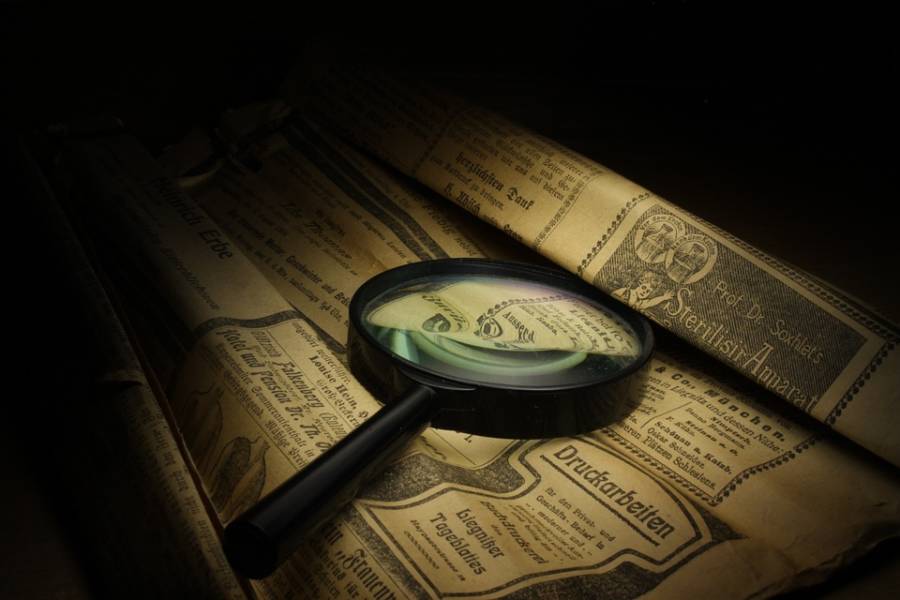
The word «clue» is derived from the archaic English word “clew,” meaning a ball of yarn, because in Greek mythology, Ariadne gives Theseus a ball of yarn to help him find his way out of the Minotaur’s labyrinth.Max Pixel
Tragedy
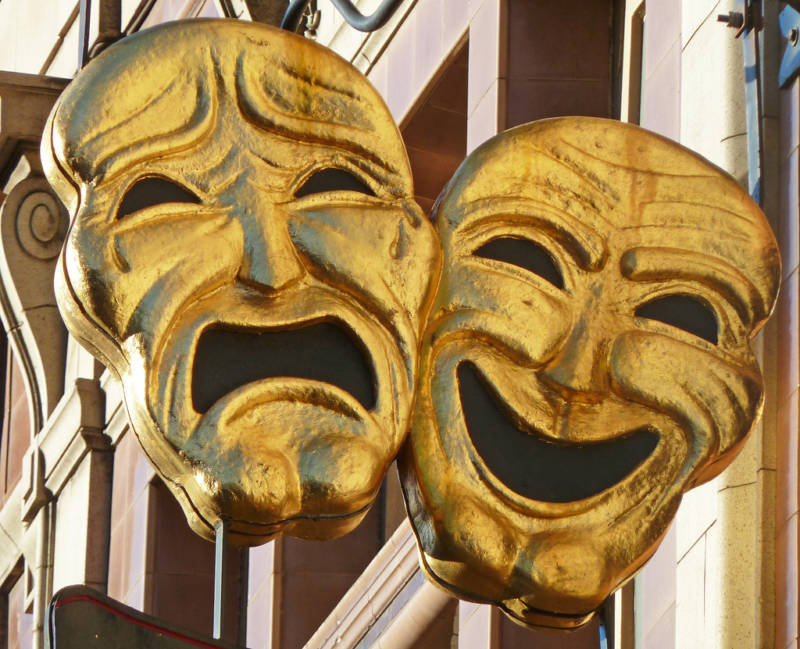
The word «tragedy» comes from the Greek «τραγῳδία» (tragodia), meaning the song of the male goat.Tim Green/Flickr
Gerrymander
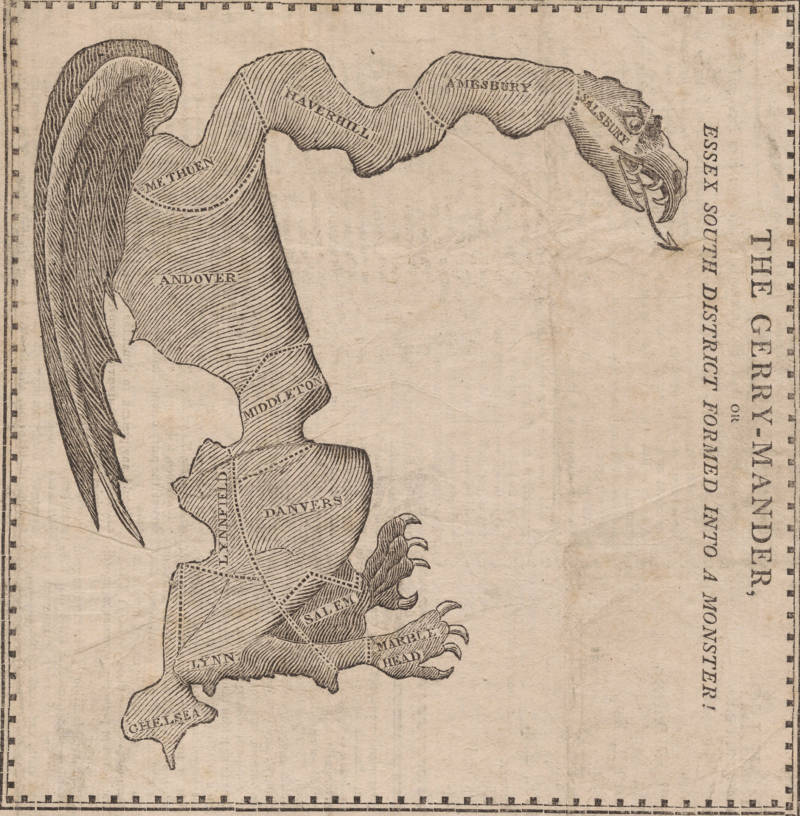
The political term «gerrymander» originated in a 19th-century political cartoon that depicted one of the new districts created by the redistricting of Massachusetts as a salamander, due to its shape. Because of the shape and the fact that the redistricting was carried out by Governor Elbridge Gerry, the word «gerrymandering» was born.Wikimedia Commons
Quarantine

«Quarantine» is the Venetian word for «40 days,» referring to the length of time during which boats had to forego contact with the shore after arriving in port if they were suspected of being infected.Wikimedia Commons
Mortgage

The word «mortgage» comes from the French expression «mort gage,» meaning «death pledge.»
Pixabay
Boycott
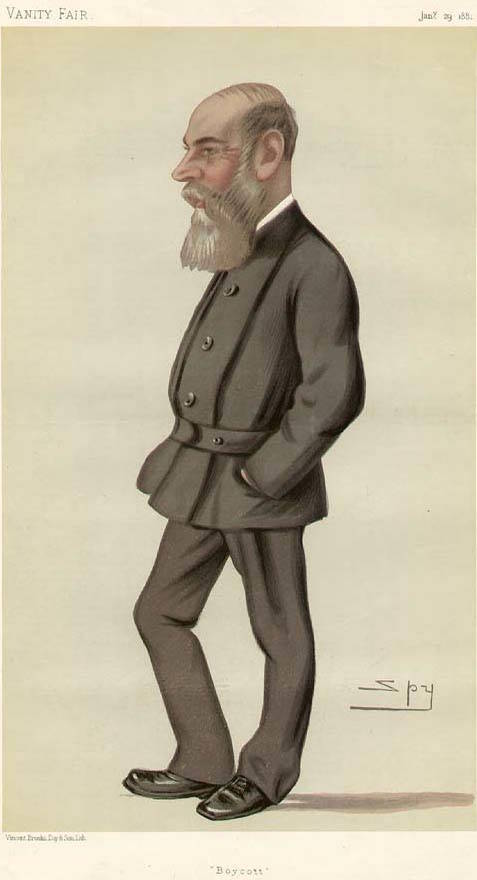
The term «boycott» comes from the name of Captain C. C. Boycott, an English land agent in Ireland, whose tenants refused to do business with him in 1880, in an attempt to get their rents reduced.Wikimedia Commons
Noon
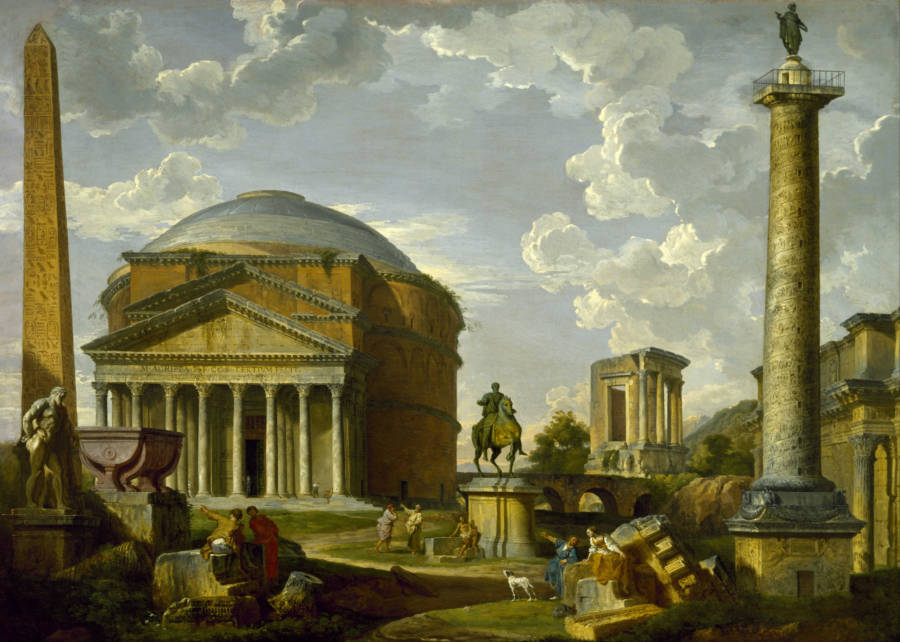
«Noon» comes from the Latin phrase nona hora or «ninth hour,» because in Ancient Rome, noon was actually around 3 p.m.Wikimedia Commons
Whether taking on loanwords from foreign languages or developing new words out of strange origins, the English language is filled with interesting words that have truly fascinating backstories.
«Ketchup,» for example, is just one word that’s used throughout English-speaking countries, but few realize that the word originated with the Chinese word «ke-tsiap» (鮭汁) which referred most commonly to a fermented fish sauce.
Over time, that term made its way to Europe through trading vessels, where people began to refer to foreign sauces as «ketchup,» a distorted version of the Chinese word. Eventually, «ketchup» came to refer to tomato ketchup in most of the world.
And «ketchup» is far from alone. Check out the unexpected origins of some of the English language’s most interesting words in the gallery above.
After this look at some of English’s most interesting words, discover the famous last words of 41 historical greats. Then, check out interesting quotes that will change how you see the world. Finally, have a look at the funniest insults from history.



